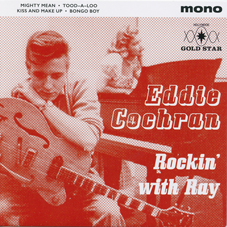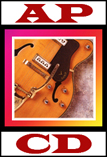
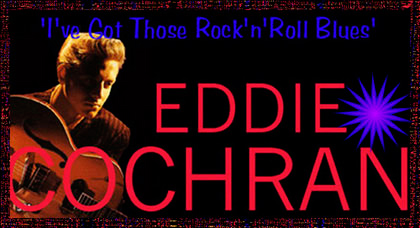
THIS IS THE FIRST PART OF EDDIE COCHRAN'S BACK-UP SESSIONS.
Eddie Cochran's prowess on the guitar ensured that he played on numerous sessions
for other artists during the fifties. His distinctive style can be easily
spotted on most records ; however, a lot of erroneous information has circulated
over the past fifty years as to whom he backed up and whom he didn't. And when one begins to investigate, it's hard to stop - such is Eddie's musical legacy's hold on discographers the world over ! The following pages will hopefully set the record straight. That said, all additions and
corrections will be welcome !
© Paul VIDAL *
Privas, France * 2006 - 2024
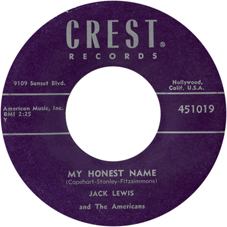 |
THE
AMERICANS It was a collective name for Crest Records' in-house group of songwriters & musicians - Ray Stanley (piano), Jack Lewis (guitar) and Dale Fitzsimmons (bass). Their name appeared on a few singles by Jack Lewis, Lynn Marshall and Bonnie Paul. The very first one was Crest #1019 by Jack Lewis, coupling 'Old Friends' with 'My Honest Name', the latter song written by Stanley, Fitzsimmons and Jerry Capehart. Although Eddie Cochran did record a demo of the song (which sounds more like a patriotic chant than anything else !), it is unclear whether he actually sings or plays on the released record. Most probably not. Likewise, Eddie does not appear on two very forgettable Americans sides, 'Chickadee Waltz', the b-side of Crest #1035 by Lynn Marshall, and 'Teenage Goodnight', the flip of Crest #1025 by Jack Lewis. But he does sing background vocals ('doo-wah, doo-wah !') on the main side of the latter, the charming 'Butterscotch Candy And Strawberry Pie'. Please see under Jack Lewis, Lynn Marshall & Ray Stanley for more info and photos in the next pages. Also, check out my page devoted to The Crest Records Story. |
||||||||||||||||||||||||||||
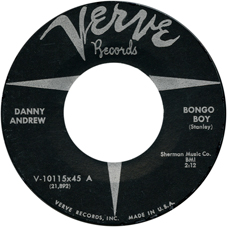
|
DANNY ANDREW Verve was mainly a jazz label founded in 1956 by Norman Granz of 'Jazz At The Philharmonic' fame. The first artist he signed was Ella Fitzgerald, whom he managed at the time. He ultimately sold the label to MGM in December 1960. In 1957, however, a few rock & pop records were issued on Verve, probably to make some money in order to compensate for the poor sales of some of his pure jazz releases. Ricky Nelson cut his first sides there, with fine accompaniment by Barney Kessel and his orchestra. That Barney could do it all ! He played an excellent solo on Jeff Allen's otherwise very weak version of Buddy Holly's 'That'll Be The Day', also on Verve (#10064). VERVE V-10115 21892 Bongo Boy 21893 As Long As We're Together The other single to track down on the label is, for obvious reasons, the one by Danny Andrew (#10115). Obvious simply because the top side, 'Bongo Boy', features another brillantly distinctive and stunningly powerful guitar backing from Eddie Cochran ! This song, and its flip, were composed by Ray Stanley and released around the same time as the other Stanley-Cochran collaborations on Zephyr and Argo. The similarity of sound with the Zephyr sides is evident. However, Eddie always tried something a touch different in each solo he delivered, and the one he took here was superb, paving the way to the one he would take in 'Sweetie Pie'. The flip, 'As Long As We're Together', an instantly forgettable piece of schmaltz, doesn't feature Eddie. As for Danny Andrew (two first names, it seems), he sounds uncannily like Ray Stanley (his two given names) to the point that I'm sure it's him. At least on 'Bongo Boy', because the singer on the other side must be a totally different person. Too bad I wasn't aware of the disc when I met Ray 33 years ago. And who plays the bongo ? Jerry Capehart, I doubt it ! I can't help thinking about Steve Rowland who was friendly with Eddie, had a Liberty release in early '57 and appeared with him in Dig Magazine...beating the bongos ! The original single is a styrene pressing (choose your stylus carefully) and has etched matrix #. 'Bongo Boy' has been reissued for the first time by Richard Weize on a Gold Star EP, RockStar-style, titled 'Rockin' With Ray', along with three songs from the same period : Eddie's own 'Mighty Mean' (which became 'Mean When I'm Mad'), Jack Lewis's 'Tood-A-Loo' and Stanley's 'Kiss & Make Up'. A nice idea. |
||||||||||||||||||||||||||||
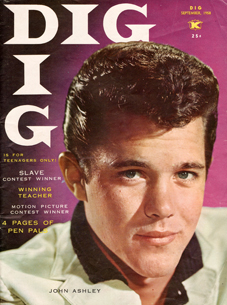
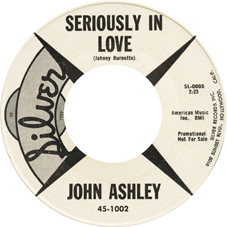
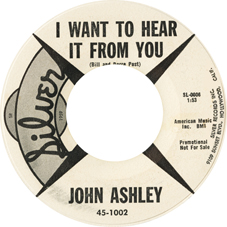
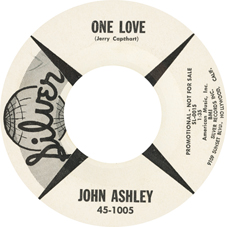 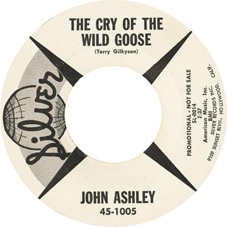 |
JOHN
ASHLEY
Good looking John Ashley is best known as an actor who had roles of varying importance in several rock'n'roll films between 1957 and 1968. He became a regular fixture in most of the American-International 'beach party'-type movies of the '60s, home of the ubiquitous Annette Funicello and Frankie Avalon ! He was Johnny in 'Bikini Beach', one of those tripes from '64, which featured good tracks by Little Stevie Wonder and The Pyramids. The next year, he starred in both 'Beach Blanket Bingo', where Donna Loren sang, and 'How To Stuff A Wild Bikini', with music by the excellent Kingsmen (of 'Louie, Louie' fame). 1967 saw him appear in 'Hell On Wheels' (with Marty Robbins as co-star) and 'Hell's Playground' (also called 'Riot At Lauderdale'). He had started ten years before, in 1957, with a leading role in an earlier American-International picture, 'Dragstrip Girl', alongside Fay Spain and Frank Gorshin. However, his best moment was certainly as John Abernathy The Third in the legendary flick from 1958 titled 'Hot Rod Gang' (re-titled 'Fury Unleashed' and severely amputated for the UK market). Legendary because it also featured Gene Vincent & His Blue Caps ! Since Ashley was under contract with Jerry Capehart, there's an Eddie Cochran connection here. Eddie and future members of The Kelly Four accompany John on two rockers he sings in the movie, namely 'Annie Laurie' and 'Hit & Run Lover'. Ashley also sang 'Believe Me' (without Eddie) which, like the others, was not issued commercially. Eddie also provided fine guitar backing to an early, unissued version of 'Born To Rock' (predating the one issued on Dot 15775 in May '58 with 'Pickin' On The Wrong Chicken' on the flip ; this single does not feature Cochran but a full band directed by Milton Rogers) and three more unissued rocking tunes : 'Don't Let Them Tear Us Apart', 'Mean Mean Woman' and the piano-led 'I Can't Let You Go' which Eddie even produced. The latter track first appeared (master take #11, in stereo and with studio chat) on the RockStar CD, 'L.A. Sessions' (RSRCD 003), in 1992. It's quite possible that Eddie Daniels should be the piano player on it. John Ashley tried hard on all those 'big beat' sides but he's not totally convincing, this being probably the reason why they weren't released at the time. His voice is therefore better suited to softer songs such as the following, produced by Jerry Capehart and once more involving Eddie Cochran, which were indeed issued on the Silver label (an offshoot of Crest Records) in 1959, though they were waxed in September of the previous year : SILVER 45-1002 SL-0005 Seriously In Love SL-0006 I Want To Hear It From You And what a fabulous 2-sider it is ! The top side, 'Seriously In Love', comes from the always fertile pen of Johnny Burnette ; that doo-woppish rock-a-ballad features Eddie Cochran on guitar (perhaps both electric and acoustic) and has John singing against a vocal backdrop by...The Four Dots ! The other side was written by Bill & Doree Post (of 'Weekend' fame) ; a ballad with a girlie chorus, it is sung delicately by Ashley with Eddie probably playing electric guitar, and has a sort of 'Think Of Me' feel about it. This record is a typical slice of late 50's Hollywood 'teen sound' but one of the highest caliber. John's other Silver single (# 45-1005) does not feature Eddie but is quite good too. 'One Love', written by Jerry Capehart, was also recorded by the mysterious Eddie Donno on Jerry's own label. Sung by Ashley to a simple acoustic guitar accompaniment, one wonders if it wasn't only intended as a demo. But at least it's better than Donno's rendition. 'The Cry Of The Wild Goose' was an old Terry Gilkyson composition that Tennessee Ernie Ford had cut way back in 1949. It was certainly selected because it was another American Music copyright (the parent company to both Crest and Silver Records) ; John sings it at a breakneck tempo over a bright, effective guitar backing, with constant changes of key, without losing the dramatic feel of the song. Other singles on Dot (#15878, 'Let The Good Times Roll' b/w 'My Story', 1958) and Intro (#6097, 'Let Yourself Go-Go-Go' b/w 'Bermuda', cut at Radio Recorders on May 31, 1957) have no Cochran involvement, nor does the one on Capehart (#5006). 'I Need Your Lovin' and 'Little Lou' were both penned by Eddie Daniels with Jerry Capehart but although Eddie Cochran had cut a fantastic demo of the latter (issued posthumously in Europe), he does not play on Ashley's brassy version. All the above tracks (and more !) were collected on the 'Born To Rock' 2-CD set put out in 2001 by the German label, Hydra (BCK 27114-1.5). 'Seriously In Love' was also part of RockStar's 'L.A. Sessions' CD. Sadly, John Ashley passed away in 1997. If we believe what was written in the October 1958 issue of Dig Magazine (pictured at left), he was born on Christmas 1934 in Kansas City, Missouri but was adopted, when only a few months old, by Dr. and Mrs. Atchley of Tulsa, Oklahoma. As for his musical tastes : 'Back home, my record collection included everything The Ink Spots ever did, plus some semi-classical discs by Mantovani and Michel Legrand, but I like Presley and Rock'n'Roll tunes, too'. |
||||||||||||||||||||||||||||
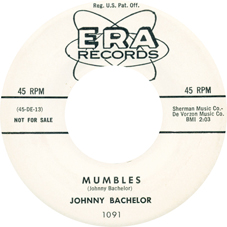 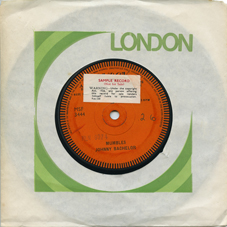 |
JOHNNY BACHELOR ERA 1091 DE-13 Mumbles DE-14 Arabella Jean With such a (real or stage) name, Johnny was dead on time to enter the 'teen idol' era (!). We would like to have more info on him but I guess we'll have to stick with the bits and pieces that can be gleaned from the few discs which bear his name as a solo artist or as a songwriter. The big one for him is his first record, released in early 1959 on Lew Bedell's Era imprint. 'Mumbles', written by him, sounds a bit strange at first but happens to be a highly innovative item, more akin to an early 60's production than one of 1959. There are almost instrumental surf overtones at times, notably when the tenor sax appears in the middle of the track. The icing on the cake is that it has all the ingredients of an Eddie Cochran involvement. The heavily echoed acoustic guitar sounds so much like his, and the overall ambience, with a panoply of weird effects, immediately brings 'Scratchin' to mind, the Jerry Neal (Capehart) Dot single. A great side. The flip, 'Arabella Jean', is the customary teen ballad, but it's a very good one, not a simple, basic slowie. There is some nice guitar (acoustic and electric) but nothing indicates that Eddie is involved - or not. He had a further single on Kem (#2764, distributed by King Records), coupling 'Bad Company' with 'Like'. As was the case for 'Arabella Jean', Bachelor often wrote in tandem with Rupert Stephens, and the pair penned both sides of a good rockin' little single by Rocky Storm & The Twinkletones on Josie (#847) in late 1958 : 'Should I' and 'My Baby Left Me swinging'. Yes, the same 'Should I' that Mike Clifford would cut with Eddie on Liberty the next year (see Clifford's entry below). They also co-wrote 'Baby Do' for the obscure Johnny & The Jays on New-York's Fairbanks label (#2001). Their best-known composition must be the excellent 'Blood From A stone' that Ricky Nelson cut on his fourth Imperial album, 'Songs By Ricky' (LP 9082), in 1959. You can see the original promo issue of 'Mumbles' on Era as well as its very rare one-sided promo issue on the British London label (HLN 9074) in the left side column. Note that the Era pressings have delta # in the dead wax (27965 and 27966). |
||||||||||||||||||||||||||||
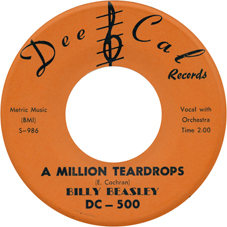 |
BILLY BEASLEY DEE CAL DC-500 S-985 Too Long S-986 A Million Teardrops Here's another oddity which makes collecting records so fascinating. I was still trying to find out exactly who John T. Webster III was, he who recorded the soulful 'A Million Teardrops', written and produced by Eddie Cochran himself, for the Freedom label (see Webster's entry on another page), when suddenly I came across a '45 on the - definitely not West Coast-based, and Sheldon-pressed - Dee-Cal label (# DC-500) featuring the very same song but sung by a certain Billy Beasley ! Would it be Webster's real name? The reverse side, however, is not 'Gotta' Make Love To You' but a very good rockin' blues number, Chicago-style, 'Too Long', written by 'Harris & Robinson'. Aurally, the vocalist seems to be the same on both sides but, if anything, it only adds to a mystery which hasn't yet been fathomed out. |
||||||||||||||||||||||||||||
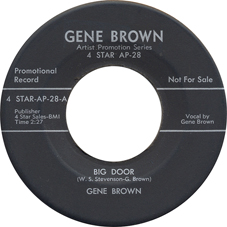 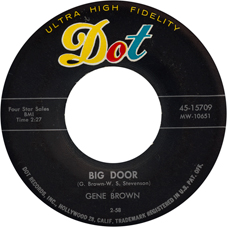 |
GENE BROWN 'Big Door' is a minor rockabilly classic, but a classic nonetheless. It's also one of the only 45's of the genre which saw three releases in a matter of three months ! The first one is pictured at left ; it was part of 4-Star's Artist Promotion Series (AP-28) and the first pressings were on thick vinyl. It was subsequently issued on 4-Star 1717 before being leased to Dot Records (#15709, also pictured at left) in February 1958. In the booklet accompanying Ace's fantastic 'Dot Rock'n'Roll' CD (CDCHD 592, 1996, highly recommended), Rob Finnis indicated that the recording of this single took place in November 1957 at Gold Star. The characteristic cavernous sound of the studio is unmistakable. However, he didn't give any details about the musicians at play there. Now, there are those who say that Eddie Cochran didn't play on the record, and those who think that he did because the guitar/double bass combination sounds a lot like Eddie and Guybo at the time of the Ray Stanley sessions, with Eddie always trying something a bit different. The guitar solo on the pulsating 'Big Door' does incorporate many of his motifs. But mention should also be made of the flip side, a very nice country ditty called 'Playing With My Heart Again' and featuring a splendid solo in the great tradition of Chet Atkins, much like the one Eddie played in Capehart's 'That's What It Takes To Make A Man'. However, there's a bad note near the end of 'Big Door' and something in the overall sound which continue to throw doubt on Eddie's presence. That said, it's a worthwhile addition to any collection. Gene Brown later cut for Starday and Stop but he had previously recorded 'Wildcat Boogie' and 'Just By Chance' for the B&E label out of Orlando, Florida. This latter disc is by far his rarest. Strangely enough, 'Big Door' was covered by Jack Tucker on 4-Star also (#1719). |
||||||||||||||||||||||||||||
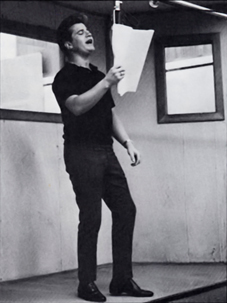
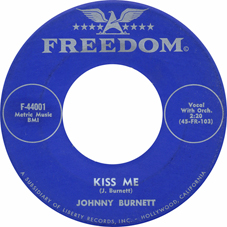
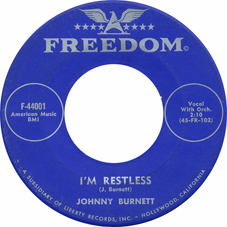
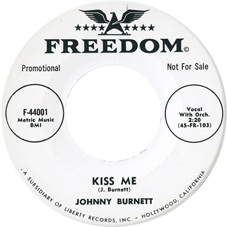
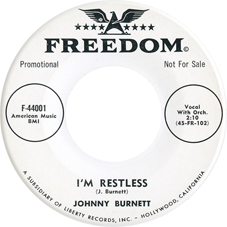
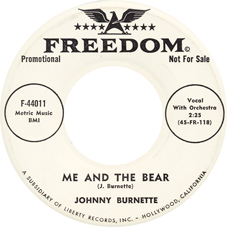
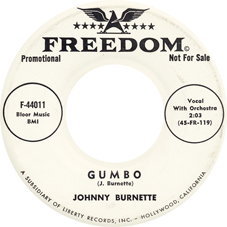
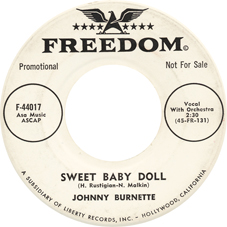
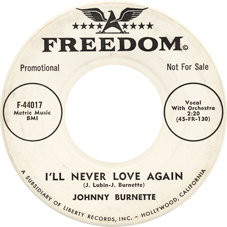
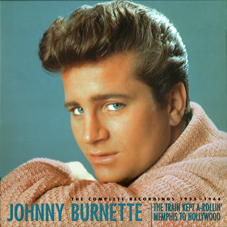
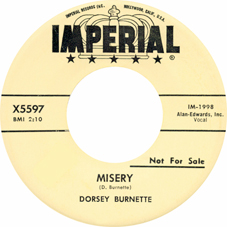 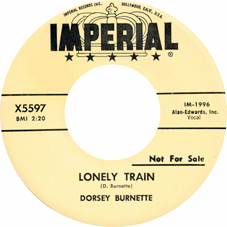 |
JOHNNY
& DORSEY BURNETTE The great Johnny Burnette needs no real introduction ; a full appreciation of his career will soon appear elsewhere on my site. Being such good friends with Gene Vincent, Ricky Nelson, Sharon Sheeley and of course Eddie Cochran inevitably led Johnny to use Eddie on a number of recordings not yet clarified as of 2020. One thing for sure, their collaboration began when Liberty launched its first subsidiary, Freedom Records, during the summer of 1958. Generally dismissed by music writers and historians, Freedom is, if not a treasure trove, at least a fine catalog of excellent and creative recordings. Jerry Capehart was hired as A&R man and one of the first artists to be signed was Johnny Burnette, whose name was mis-spelt Johnny Burnett (without the final 'e') on the label's very first release which was slated for September 15, 1958. FREEDOM F-44001 FR-102 I'm Restless FR-103 Kiss Me The poor sales of this single augured ill of the label's future. It would effectively be deactivated in late '59. These tracks were written by Johnny but both Burnettes were already superb songwriters with a strong flair for commercial but tasteful melodies. 'I'm Restless' is one of those songs that stick in your head with only one play and Johnny's singing has much to do with it. And then there's that repetitive and skillfully processed guitar line which perfectly fits the song. Joe Maphis as well as Eddie Cochran could have played it. However, the chorus in the background and the echoed drum part somewhat remind me of 'Don't Ever Let Me Go', so I tend to think that Eddie is responsible for it. All the more because, since it was Capehart's first assignment for the new imprint, I imagine that he would have played it safe by using Eddie rather than anyone else. It's equally hard to say who played on 'Kiss Me'. The very first guitar notes in the intro sound like those in 'Warm Love' and some of the guitar strums throughout the song might recall Joe Maphis but the solo doesn't sound like him - nor Eddie for that matter. It could be Johnny himself on guitar as it's not too complicated technically speaking. A different version/take of 'Kiss Me', with slight differences in both sound and vocal, was erroneously released in 1980 on the Dutch 'Let's Have A Party' album. Of course, Maphis had lent his talents to the Brothers' magnificent Imperial '45 ('Warm Love' b/w 'My Honey', #5509) earlier in the year so it's still quite possible that he was called upon for these sessions. He would play on many other Freedom releases as we will see. Another mystery concerns the syncopated drumming on 'Kiss Me' - could it be Eddie beating the skins ? Or did Eddie supply/overdub the strong bass guitar accompaniment like he did in some of the Four Dots' stuff ? Was he involved at all ? Will we ever know ? Interestingly enough, a promo copy of this single was found in Eddie's own record collection as well as one of Johnny's second Freedom '45. It coupled two more very original tunes from, apparently, different sessions : FREEDOM F-44011 FR-118 Me And The Bear FR-119 Gumbo 'Gumbo' may have been cut at the 'I'm Restless' date but it's doubtful, and although it's never been ascertained, I'm one of many who still think that Eddie plays guitar on it. There's a bit at the beginning that sounds definitely like him but there's still a chance that Joe Maphis may have been present, too. The speeded-up guitar part on top of the swampy bass line which follows it note for note may have been provided by any of them. Certainly much overdubbing had been necessary and the final mix doesn't reveal all the secrets of the session. On the other hand, there's not any doubt as to their presence on the other song, the busy, story-telling 'Me & The Bear' : the session sheets have been found and indicate that Eddie, Joe Maphis, Connie 'Guybo' Smith, Plas Johnson, Ray Johnson and Earl Palmer all played on that December 11, 1958, recording date held at Gold Star Studios. The Los Angeles A-team, no less ! There's some driving piano throughout and a few blasts of tenor sax, however the main feature of the song is that guitar riff which cleverly echoes the Rock'n'Roll Trio sound, again on top of a heavy bass line : Eddie or Joe ? Joe was supposed to also play banjo at the session (details below), so maybe it's Eddie who was in charge of the lead guitar work. But, because we all know that session sheets do not always tell the whole truth, there's also the possibility of Paul Burlison's involvement here ; in issue #27 of 'Record Exchanger', writers Dennis West and John Blair noted that 'Burlison joined Johnny on some, if not all, of the Freedom recordings'. All the above sides are superbly produced and the session tapes, if they existed, would make for fascinating study. Note for collectors : Both promotional and commercial issues of Freedom 44001 have stamped matrix # in the dead wax, whereas the promo copies of Freedom 44011 haven't and the latter also have delta # (28117 and 28118), indicating that the disc came out in February 1959. Back to the December 11, 1958, session. According to the Burnette box set on Bear Family, Johnny and the band cut three more songs - all Jerry Capehart compositions - for which, alas, the tapes have been lost or destroyed : FR-115 Remember FR-116 Dutchman's Gold FR-117 The Table If the above matrix numbers are correct, it must be precised that they were re-assigned as follows : FR-115 Way Out Far (Sherman Scott - Freedom F-44009) FR-116 Cryin' Towel (The Upperclassmen - Freedom F-44010) FR-117 Cha Cha With The Zombies (The Upperclassmen - Freedom F-44010) One can wonder if Capehart didn't use these lost tapes as demos because he somehow managed to pitch 'Dutchman's Gold' to Walter Brennan who cut it on Dot (#16066, March 1960). FREEDOM F-44017 FR-130 I'll Never Love Again FR-131 Sweet Baby Doll Eddie was not involved in Johnny's last Freedom single which, once again, was a complete delight - and a flop. The top side, co-written by Johnny and a J. Lubin, is one of the most perfect ballads of the 50's ; his vocal is a triumph of emotion and a lesson in phrasing that only the likes of Gene Vincent or Elvis could rival. The six-string bass and the use of arpeggios on the guitars are extremely effective here, as is the excellent mixed chorus. 'Sweet Baby Doll' is a real rocker, with hammering piano and a splendid guitar break by...Rene Hall, when we all thought it was James Burton ! At least, that's what the Bear Family box set tells us. The tracks were cut on May 8, 1959, at Master Recorders in Hollywood and also present at the session were Bill Pitman (listed on guitar - but he's the one who probably played the six-string bass), Clifford A. Hils (bass), Gene Garf (piano) and Earl Palmer (drums). Released in mono on the original single, stereo versions of the two songs appeared on the RockStar LP, 'We're Having A Party' (RSR-LP 1017), in 1988, with 'I'll Never Love Again' being a different take. And the clean stereo separation between Johnny's vocal and the responding chorus in 'Sweet Baby Doll' gives another dimension to the song. The excellent 'Love Kept A-Rollin' and 'That's All I Care' are supposed to have been cut at that same recording session. Note for collectors : the promo copies of Freedom 44017 have stamped matrix # in the dead wax. Eddie Cochran did play on another totally unissued (at the time) session which took place at Gold Star on August 25-26-27, 1959, a decidedly busy and productive period for him. Five tracks were committed to tape : Ballad Of The One Eyed Jacks (Johnny would re-cut it in February '61) You're Cheatin' On Me Blue School Days Just Keep On Goin' Just A Memory They first appeared, complete with false starts and overdubs for 'You're Cheatin' On Me', on another Hydra CD, 'Johnny & Dorsey Burnette - Rock & Roll Tonight' (BCK 27110). In 2002, the exemplary Bear Family label put out the definitive box set on Johnny Burnette : 'The Train Kept A-Rollin' - Memphis To Hollywood' (BCD 16438), a 9-CD spectacular ! All the above songs are featured plus just about everything Johnny cut for Von, Coral, Imperial, Freedom, Liberty, Chancellor, Infinity, Reprise, Capitol and Magic Lamp, the icing on the cake being the inclusion of more than a hundred demo recordings ! Only a dozen of them had previously been available, in mediocre quality, on a Solid Smoke long-player. Johnny's brother, Dorsey Burnette, could also convey much emotion as a singer, but with a huskier voice. He cut several solo sides for Imperial in 1959, one of which, recorded on April 13, 1959, most certainly features Eddie Cochran on rhythm guitar : a medium, chugging, hypnotic rocker called 'Misery'. IMPERIAL X5597 IM-1996 Lonely Train IM-1998 Misery James Burton plays lead guitar. The other side, 'Lonely Train', is a haunting ballad with a country'n'western feel and banjo in the backing. All of Dorsey's Imperial recordings were collected on a RockStar CD from 1994, 'The Burnette Brothers' (RSRCD 005). |
||||||||||||||||||||||||||||
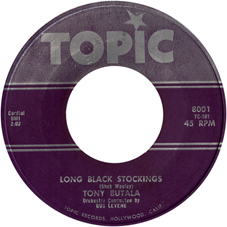 |
TONY BUTALA I could give one day of my life to travel back in time to 1959 and attend the Hollywood session which produced 'Long Black Stockings' by Tony Butala on Topic 8001. This is a great rocker with a guitars & sax arrangement so clever that one can only suppose that Eddie Cochran is present in the studio. It is more than reminiscent of 'Summertime Blues' without touching the exact same chords for all that. There are two powerful electric guitars in the backing but no solo. The flip, 'Rumors' was often thought as being a cover of Johnny Crawford's hit from 1962 on Del-Fi but it's an entirely different song, with a double tracked vocal à la Everly Brothers. Some still think that Butala's disc was indeed from 1962 because it appeared on the UK Salvo label that year but Jerry Osborne has confirmed that it was issued originally in 1959. It really sounds much more '59 than '62, and by that time, Tony had been with his group, The Lettermen, for a full year. What puzzles me is that I can't believe that nobody ever bothered to ask Butala about this disc. It was written and perhaps produced by Sheb Wooley, the country singer who cut lots of fine sides on MGM and also doubled as Ben Colder for more humorous stuff. The orchestra was conducted by Gus Levene. Tony had a second excellent single on Topic which featured one of Joe Maphis's best guitar breaks. He then recorded for Lute (the very nice 'Walkin' You Home') in 1960 before forming The Lettermen who had a string of hits on Capitol in the 60's starting with 'The Way I Feel Tonight' in 1961. I'd like to know if it's him who co-produced (with B. Todd) a Vulcanes single from 1962 on Goliath ('Stomp Sign', # 1348). Now, does Eddie play on 'Long Black Stockings' ? It's anyone's guess. |
||||||||||||||||||||||||||||
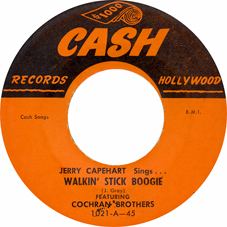
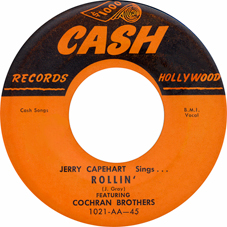
-PS.jpg)
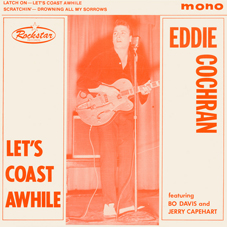
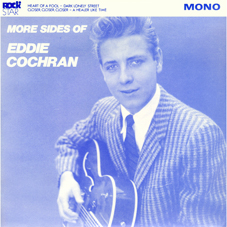
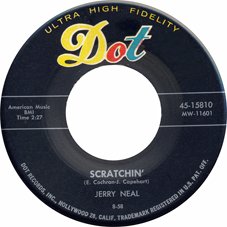
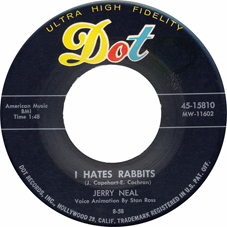
|
JERRY
CAPEHART
The role that Missouri-born Jerry Neal Capehart played in Eddie Cochran's career is ambiguous - and one could easily draw a parallel with Norman Petty's guidance of Buddy Holly's career. In the mid-fifties, Jerry decided to seek fortune in the country music field and began writing songs. He met Eddie Cochran at a music store in Bell Gardens while Eddie was still part of The Cochran Brothers and hooked up with them in order to cut some demos. ROCKSTAR RSR-EP 2010 Closer, Closer, Closer A Healer Like Time These were two of the earliest examples of their collaboration. It was already apparent that Jerry was not really a singer, a fact which became evident when he secured a one-off record deal with John Dolphin and somehow tried his hand at the new shakin' music with the mythical single :
CASH 1021
1021-A Walkin' Stick
Boogie
1021-AA Rollin' Besides Eddie and Hank on guitars, the backing band was Ernie Freeman's, with Ernie himself on piano. Eddie easily stole the show with his inventive guitar breaks, especially on 'Walkin' Stick Boogie', but the record went nowhere. Dolphin was never noted for promoting his stuff ; if a record sold, that was OK, if it didn't, forget it. The names of his labels spoke for themselves ! Jerry would also sing 'Rockin' & Flyin', again backed up by Eddie and the Ernie Freeman Combo plus Joe Maphis in early '56, but this will be discussed in detail in the next 'Back Up Sessions' page. At this early stage of Eddie's career, however, Capehart's entrepreneurial skills proved determining : a deal with American Music, a huge publishing house, followed in the early months of 1956. More demos were cut, mostly at Gold Star Studios, with Eddie and Hank on guitars plus Connie 'Guybo' Smith on bass fiddle and Jerry making up for the drums with an amplified cardboard box, up to the time of Eddie's first solo single on Crest. These are the ones on which Capehart sang, first published by RockStar Records : ROCKSTAR RSR-LP 1009 That's What It Takes To Make A Man ROCKSTAR RSR-EP 2010 Heart Of A Fool ROCKSTAR RSR-EP 2003 Latch On ROCKSTAR RSRCD 010 This Must Be The Place 'That's What It Takes...' is probably Jerry's best vocal, with an absolutely sumptuous Chet Atkins-style backing from Ed who shines again on 'Heart Of A Fool' with a perfect rockabilly solo. 'Latch On' had already been cut twice by The Cochran Brothers with Hank Cochran on lead vocal. They had a third go at it, Bill Haley-style this time, at the 'Skinny Jim' session - with Capehart's voice added. 'Fool' ended up being recorded by Lee Denson on Vik (in a surprisingly very inferior version) and 'Latch On' went to Ron Hargrave. When Hank Cochran split, Capehart took Eddie under his wing and became his manager & producer. He was undoubtedly a good songwriter (as Bob Denton has rightly pointed out in interviews) but knew nothing about record production. I guess he learned a lot from both Stan Ross (the Boss at Gold Star) and Eddie himself. He nonetheless contributed to shaping Eddie's style and sound over the years. In August 1958, Jerry released a single under the pseudonym, Jerry Neal, the top side of which was a fabulous Cochran instro with several guitar overdubs including a speeded-up part not unlike what Joe Maphis was sometimes doing on his LPs : DOT 45-15810 MW-11601 Scratchin' MW-11602 I Hates Rabbits The flip was probably (and fortunately) the last song ever sung by Jerry ! But in that 'novelty' context, with all the necessary sound effects ('Voice Animation by Stan Ross') and crack accompaniment by Eddie, Earl Palmer and Plas Johnson, it worked OK. Some, like Ray Stanley, thought Capehart was 'in for the quick buck' (that's what he told me in 1987). Indeed, Jerry strived to find a replacement for Eddie after his death and even issued a record under his own name featuring another Cochran instrumental, 'Song Of New-Orleans', initially titled 'The Fourth Man Theme' since it was an obvious variation on 'The Third Man Theme' : CREST 1101 Song Of New-Orleans (Theme For) The Young And Blue The other side was also instrumental, very melancholic, with a prominent harmonica and no Cochran involvement. By the end of 1959, Eddie's relationship with Jerry had soured considerably. Capehart had taken on too many other commitments and certainly couldn't concentrate on Eddie's career. There was also the fact that Snuff Garrett had put horrible strident strings on 'Hallelujah, I Love Her So', perhaps with Jerry's complicity. Plus, Eddie's pals were not Jerry's, and vice versa. Consequently, Jerry did not participate in Eddie's last recording session (January 8, 1960) and didn't go with him to England afterwards. But he co-wrote top class material with Eddie and undoubtedly helped him get off the ground and find his own way. Bobby Cochran, Eddie's nephew, offers an interesting perspective on Jerry in his book, 'Three Steps To Heaven', co-written with Susan Van Hecke. A complete listing of Jerry Capehart's compositions appears on the 'Eddie's Pals' page. |
||||||||||||||||||||||||||||
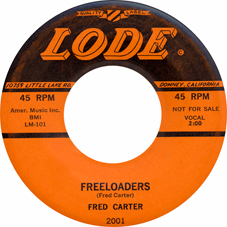 |
FRED CARTER Now, here's another awesome twin-spin rocking disc cut for the Lode label (#2001) when it was still based in Downey, California. The funny 'Freeloaders' (who hasn't known a few of them ?!) is loaded with great, strong guitar sounds, the rest of the backing being comprised of a neatly slapped double bass, drums and a piano which was mixed far behind to the point of being almost inaudible. There's also some chorus in places and very effective handclaps. Its flip, 'I'm In Love (With The Girl Next Door)', is just as tuneful and exciting, with a female chorus a bit more to the fore. This latter song has a sort of Buddy Holly flavor to it and could have easily fitted the post-Buddy Crickets. Fred Carter had written 'Pretty Little Devil' and co-written 'Thinkin' About You', two songs which would be recorded by Bob Denton with Eddie Cochran helping out on guitar and harmony vocal, so it was evidently rumored that it was Eddie who played the powerful soli on Fred Carter's Lode release. Not so, it was Carter's own job. He later turned to country music and session work. Original first pressings of that Lode single have delta # in the dead wax (20919 and 20920 respectively). Fred's demo of 'Pretty Little Devil' was first issued on a RockStar CD, 'One Minute To One', in 1996. |
||||||||||||||||||||||||||||
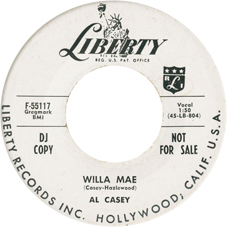
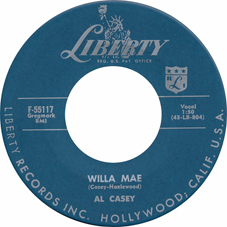 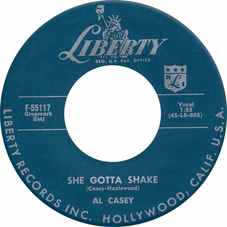 |
AL
CASEY Al Casey was a major figure on the Arizona and Los Angeles recording scenes of the '50s a nd '60s. A top flight guitar player, with a highly distinctive style, he was also prominent on just about any other stringed instrument - including the piano ! His classic guitar licks appear on countless Duane Eddy, Jody Reynolds, Loy Clingman and Sanford Clark cuts but he's best remembered for his stellar work on the latter's 'The Fool' in 1956 (MCI #1003, then Dot #15481). He released a handful of solo singles in the '50s, notably 'A Fool's Blues' b/w 'Juice' (Dot #15524, in November '56) and '(Got The) Teenage Blues' b/w 'Give'n Up' (Highland #1002). In '62 and '63, he cut a clutch of great surfin' singles on the Stacy label (i.e. 'Surfin' Blues' b/w 'Guitars, Guitars, Guitars', Stacy #964) with some success ; the label even issued a very rare album by him, 'Surfin' Hootenanny' (Stacy #100, in September 1963), pressed on mottled green vinyl. All the while, he played on sessions for established as well as obscure artists, such as Don Cole ('Snake Eyed Mama' b/w 'Kiss Of Love', RPM #502). Interestingly, the rockin' top side of that record features Al on piano. A piano sound which is also present on the following Al Casey single (cut at Gold Star in late '57), one of particular interest to all of us because it does feature Eddie Cochran on guitar. LIBERTY F-55117 45-LB-804 Willa Mae 45-LB-805 She Gotta Shake Most discographies state that Eddie plays rhythm guitar on the driving rocker, 'Willa Mae'. Al Casey himself confirmed Eddie's presence 'on electric rhythm guitar'. The only problem is, if there is indeed a second guitar, it's pretty impossible to detect ! To me, Al sings and plays rhythm or piano on this track while Eddie plays lead guitar in his usual powerful way. If you listen closely to the solo, it begins as pure Casey but quickly continues and ends as pure Cochran. In Sue Van Hecke's & Bobby Cochran's book, 'Three Steps To Heaven', Jody Reynolds confirms that Eddie did play the 'guitar lick, using a '$39 box tremolo by DeArmond that had a vial of mercury in it that bobbed up and down to electric impulse'. The flip, 'She Gotta Shake', is a typical Phoenix-style production - funky and reverb-heavy on the guitar - with some vocal interjections by Casey rather than real singing. In all probability, Eddie is not involved. But the story doesn't end there. Its basic track was overdubbed with sax and vocal background a few months later and became 'The Walker', the flip side of 'Ramrod', another Al Casey instro which was issued as Duane Eddy's third Jamie single (#1109) during the summer of 1958. Around the same time, Eddie Cochran was playing on sessions with a vocal group, The Four Dots (see entry on the next page). One of the songs, 'Bread Fred', has an almost identical backing track which can be heard on 'Eddie Cochran - 20th Anniversary Special' (RSR-EP-2007). Did Eddie remember the tune from the session itself ? Or was it some kind of arrangement with Al Casey since he had played lead on his record ? Or was it pure coincidence ? We'll never know. 'Willa Mae' was included in the Eddie Cochran Box Set (EMI-Liberty ECB 1) in 1988. |
||||||||||||||||||||||||||||
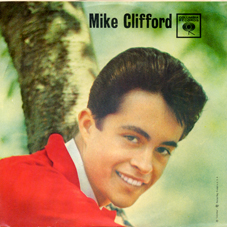 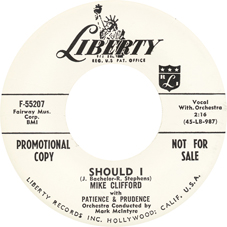 |
MIKE CLIFFORD
We don't have much on Mike Clifford whose career seems to have lasted pretty long and who had a top twenty hit in the US with 'Close To Cathy' (UA #489, late '62). Having previously been with Columbia, he went on to record for Cameo, Sidewalk, Air and American International. He also sang 'The Golden Breed', the title song to the movie of the same name, a Sidewalk production from 1967 about 'the world's best surfers, their girls and their action - in and out of the Big Surf !'. Its excellent soundtrack appears on a scarce Capitol album (ST 2886). But Mike's career began in 1959 with two singles on the Liberty label, the first of which featured Eddie Cochran on guitar. LIBERTY F-55207 45-LB-987 Should I 45-LB-988 Whisper, Whisper In a 1989 interview with Alan Clark, Mike Clifford recalled that his producer, Mark McIntyre, was friendly with Eddie and asked him to play on 'Should I', a lightweight rocker co-written by J. Bachelor and R. Stephens (not the Larry Bright song of the same name on Highland #1052). Clifford explained that he was not present when the backing track was laid down and only met Eddie a bit later at the mixing session. He must have been proud of the results because Eddie's stinging guitar work really enhanced the disc in a big way, which saw Mike backed up vocally by Patience & Prudence on both sides ! Mike Clifford's other Liberty release (#55219) coupled the standard, 'I Don't Know Why', with a song co-written by Mark Mc Intyre, 'I'm Afraid To Say I Love You', which sounds like a rip-off of both 'Poor Little Fool' and 'Teenager In Love'. It's not bad at all, though, but it's clear that the Liberty management was looking for their own Fabian or Frankie Avalon ! |
||||||||||||||||||||||||||||
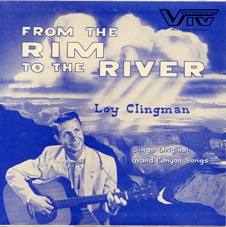 |
LOY CLINGMAN Arizona-born Loy Clingman's association with the Viv label began in 1955. He would cut three very sought-after records there, two singles and one EP. 'Uranium Blues ' (#2000) was the first single and 'Rockin' Down Mexico Way' (#3401) was the last. In between them, he recorded an EP, 'From The River To The Rim' (#2002), of songs about the grand canyon. Al Casey was featured on all three, as well as on his 1957 release for another Phoenix, Arizona label, Liberty Bell ('It's Nothing To Me' b/w 'I'm Low, Low, Low', #9012) which was eventually picked up by Dot (#15567) for national distribution. In 1958, after Lee Hazlewood's departure for Dot Records, Loy became the label's owner. The full story, written by Arizona music expert John Dixon, can be read in the book which came with Bear Family's 'Phoenix Panorama' box set (BCD 15824) in 1995. Loy nevertheless recorded a few more sides for other labels over the years, most notably for Swan, the Philadelphia-based company which gave us 'Silhouettes' by The Rays and 'Butterfly' by Charlie Gracie. 'We were in Gold Star studios and Eddie Cochran played lead on Lee's song, 'The Man Who Made An Angel Cry', he told Dixon. SWAN S 4017 The Man Who Made An Angel Cry Showdown A scarce and nice single albeit not earth-shattering. Eddie's presence is more discernable in the top side, which had previously been recorded by Sanford Clark (Dot 15646, September 1957). It's more than likely that Eddie and Al Casey both play on this record. |
||||||||||||||||||||||||||||
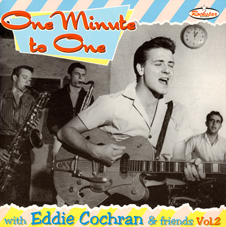 |
JUNE COCHRAN
ROCKSTAR RSRCD 010 I Dream Of You She was Bob Cochran's wife and Eddie's sister-in-law. In the book, 'Three Steps To Heaven', Bobby Cochran recalls that his Mom was 'a gifted vocalist who had studied opera when she was a teen'. She certainly sang very well, with more than a touch of Julie London in her phrasing, but her musical career comes down to only two lovely recordings which appeared on the 'One Minute To One' RockStar CD in 1996. There's bass, brushes plus Eddie who plays the complex guitar chords in these two jazz-pop tunes probably cut at someone's home studio. 'I'm Confessin' is the same song that Ricky Nelson did on his first Imperial LP in 1957 ; it was previously a hit for Les Paul & Mary Ford on Capitol in 1952. Crickets are distinctly heard in the background, suggesting it was cut at night - and recalling the crickets heard at the end of Buddy Holly's 'I'm Gonna Love You Too'. Life is strange. |
||||||||||||||||||||||||||||
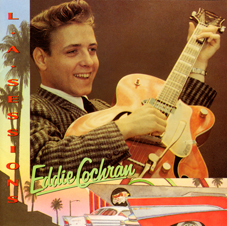
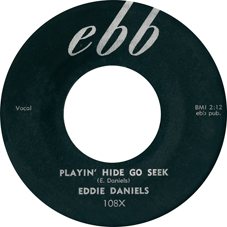 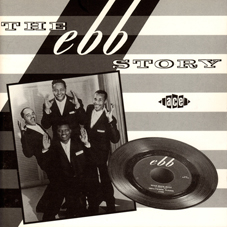 |
EDDIE DANIELS
ROCKSTAR RSRCD 003 I Wanna Know Uh Oh Little Girl Eddie Daniels was a black singer & pianist who really sang like a white rockabilly Cat in a hiccupy style. His two self-penned singles on Leonora Rupe's Ebb label out of Los Angeles attest to that assertion. The first one (#108, issued in 1957) coupled the frantic 'Playin' Hide Go Seek' with the Fats Domino-inspired 'Whoa Whoa Baby'. These are two excellent tracks with lots of piano and fine guitar breaks, perhaps played by Rene Hall. The other (#133, 1958) featured the pounding piano/guitar rocker, 'I Wanna Know', always with Daniels's quavering vocal. You can find the latter on an Ace CD, 'The Ebb Story' (CDCHD 524). He had another sought-after '45 on Starla (#9, 'Hurry Baby' c/w 'Hug Me, Kiss Me'), the label on which Kip Tyler also recorded, but Daniels is best known as being part of the duo, Jewel & Eddie, who recorded for the Silver label with valuable assistance from Eddie Cochran. Jewel was Jewel Akens of course and we'll discuss their recordings in the next 'Back-Up Sessions' page, along with those by The Four Dots. In 1992, when RockStar put out their wonderful 'L. A. Sessions' CD, we had the pleasure to discover that Eddie Daniels had cut at least a couple of solo sides under the auspices of the Cochran-Capehart team. Two takes of 'I Wanna Know', now redone as 'I Wanna Love', can be heard with studio chat. Jerry Capehart is in the control room, giving instructions to Connie 'Guybo' Smith and telling the drummer (who was he ?) to 'do it then, play what you feel'. So, take 7 is a false start but take 8 is complete, and in stereo to boot ! It's an excellent remake of the Ebb cut, bouncy rather than pounding, more polished, with a girl chorus and a fluid piano solo. Take 1 ultimately appeared in mono on a further RockStar disc, 'Don't Forget Me', in 1998. If that wasn't enough, two takes of a second song, 'Uh Oh Little Girl' (Daniels was very fond of those 'Uh Oh' interjections), are presented again in stereo. Take 2 is a false start with some dialogue with Larry Levine, the sound engineer at Gold Star, and some amusing chat in the background. Take 7 is complete and starts with Eddie counting 'one, two, three'. We are then treated to the same phenomenal bass guitar intro as in 'C'mon Everybody' which launches another good rocker with a galloping Eddie Cochran guitar solo. The overall sound and arrangements suggest that all these tracks were cut in late '58 or early '59, perhaps with Silver releases in view. My only complaint is that RockStar, and Derek Glenister in particular, were sometimes a bit sparing of details as regards recording sessions data. | ||||||||||||||||||||||||||||
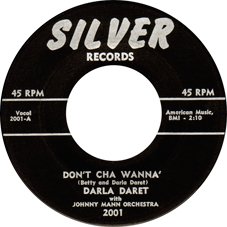 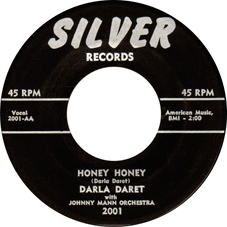 |
DARLA DARET
SILVER 2001 2001-A Don't Cha Wanna' 2001-AA Honey, Honey I don't have much on Darla Daret except that she previously sang on one side of a Bob Wills Decca single cut in L. A. in 1956, 'Sugar Baby', that she co-wrote with her sister, Betty Daret. They both provided the predominantly acoustic 'Don't Cha Wanna' for Darla's Silver single which was released in late 1957 (according to the delta # in the dead wax) and was certainly the first outing on that Crest label offshoot. Eddie's presence at the session has long been acknowledged and the acoustic guitar backing sounds very much like the one heard in Lynn Marshall's 'The Hat' on Crest. It's a jaunty little number with handclaps and a good dose of echo on Darla's very clear voice. 'Honey Honey', like the other side, is a very pleasant pop-rocker, in that typical 50's California-style, with Eddie switching to his electric Gretsch. The female vocal chorus in both songs probably included some of Johnny Mann's singers but only The Johnny Mann Orchestra is credited on the actual record. In order to avoid bootlegs, the original record is on thick vinyl (often a clue for authenticity - but not always) and has 'Re' as well as delta # (18796 and 18797) in the dead wax. |
||||||||||||||||||||||||||||
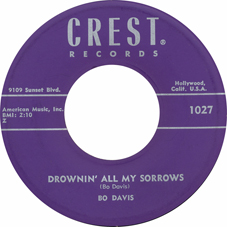 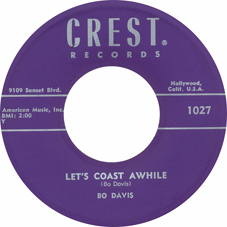 |
BO
DAVIS (aka
GENE DAVIS) CREST 1027 Y Let's Coast Awhile Z Drownin' All My Sorrows We all know the story by now. Bo Davis was not Hank Cochran in disguise but Gene Davis, a good rockabilly singer who went on to cut sides for Challenge, Rosco, R-Dell and Toppa. Both sides here are outstanding classics with Eddie's guitar all over the place - growling, stinging, rocking, rolling ! Like Buddy Holly, Eddie had developed a style of guitar playing that was particularly effective in a small combo : there was just about no need of a second guitarist. There is, however, some acoustic rhythm guitar in 'Let's Coast Awhile' but it remains to discover whether it was played by Davis or by Hank Cochran who was supposedly present at the session - hence the initial mistake regarding Bo Davis's true identity. This record was cut sometime in July 1956 at Master Recorders in Hollywood, at the same session which produced Eddie's first solo outing ('Skinny Jim') - without a doubt, one of the greatest ever rockabilly sessions. Both tracks have appeared on countless RockStar releases through the years, the first one being the 'Many Sides Of Eddie Cochran' LP (JGR 1001) way back in 1974. This album was reissued with a different cover, and a much better remastering, in 1979 (RSR LP 1001). |
||||||||||||||||||||||||||||
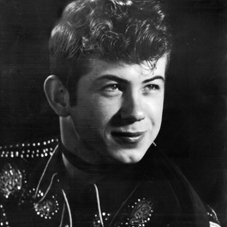
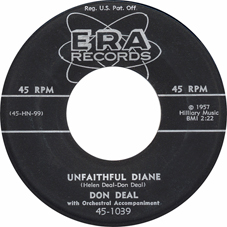
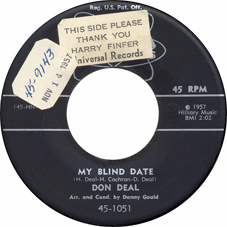
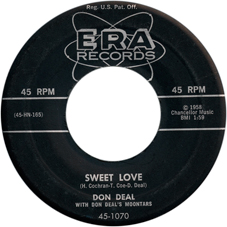
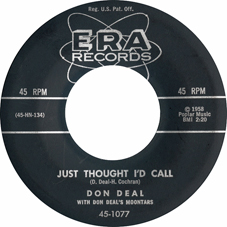
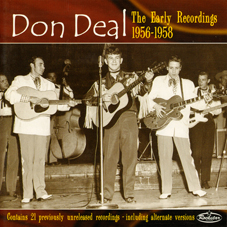
|
DON
DEAL When I made contact with Don in 2002, he said he was a happy man. Living on a farm near Branson, Missouri, he had more followers at that time than he had in the '50s. From his web site, you could order several CD singles containing some of his coveted Era stuff. Like Bob Denton's or Ray Stanley's, Don's name is forever linked to Eddie Cochran's. They met while touring with the Cochran Brothers in 1955. Prior to that, Don had been playing with Smokey Rogers & His Western Caravan down in San Diego. Jerry Capehart, who had just taken the Cochran Bros under his wing, persuaded John Dolphin (head of Cash Records in L.A.) to issue Don's first record, 'Broken-Hearted Fellow' b/w 'Cryin' In One Eye' (Cash 1028), a honky tonk double-sider from early 1956. Contrary to belief, though, it is NOT Eddie Cochran who plays lead guitar on these sides but Joe Maphis, probably with Ralph Mooney on steel. However, The Cochrans may supply the harmony vocal to 'Cryin' In One Eye', a number Don co-wrote with Tom Reeves (the 'Primitive Love' man on Crest) and one he was not particularly fond of. 'Broken-Hearted Fellow' is indeed a better song. The overall sound leads us to believe that the songs were cut at a professional studio - possibly at Capitol, since Jerry Capehart, The Cochran Bros and Joe Maphis recorded there around the same time. Both songs were legally reissued for the first time in 1989 by UK's RockStar Records on the 'Thinkin' About You' LP (RSR 1019). Eddie re-entered the picture the following year, when Don signed a contract with Era Records. His first single for the label (#1039) coupled the attractive 'Unfaithful Diane' with 'Devil Of Deceit', both written by Don with his mother, Helen Deal. It has been suggested that Eddie played on those cuts and it does sound a lot like him - especially 'Unfaithful Diane' with its melodic guitar solo very similar to those Eddie played on Bob Denton's records of the same time. Bob Grimes, who helped put together Don's web site, says that it's a Fender Telecaster guitar which was used on that session rather than a Gretsch ; now, we all know that Eddie could handle just any kind of guitar but that's Tommy Coe who plays here. There is no doubt as to Eddie's presence on one side of Don Deal's second Era '45, though ; the loping 'My Blind Date', co-written by Don, his mother and, interestingly enough, Hank Cochran, features a good, smooth-sounding solo from Eddie who's possibly also singing harmony vocal as well. All these songs were recorded at Stan Ross's Gold Star studio. Don's final Era singles (#1070 & 1077, both issued in 1958) were credited to Don Deal & The Moontars. 'Sweet Love' is a medium-paced rocker with a prominent saxophone backing. Heavy on acoustic guitars, Era 1077 featured two very nice Ricky Nelson-sounding ballads again co-written by Don and Hank Cochran, who was in fact part of Don's band. Eddie doesn't play here although one of the cuts ('Just Thought I'd Call') apparently came from the same session as 'My Blind Date'. But Eddie played lead guitar on another track, the rockin' 'Don't Push', which laid unreleased until its appearance on the revered 'Hollywood Rock'n'Roll' LP in 1975 (CH 1), the first ever outing from the UK's premier specialist label, Ace Records, then called Chiswick. Happily, all of Don's recordings from the 1956-1958 period were compiled onto a fabulous CD by RockStar Records (The Early Recordings - RSRCD 028) in 2006. Besides the released stuff discussed above, the disc contains 21 previously unreleased songs which stem from two different Gold Star sessions. From the 1957 date, we have alternate versions of 'Don't Push', 'Goofin' Around', 'Sweet Love' and 'A Chance Is All I Ask'. The two takes of 'Goofin' Around' are sung by Hank Cochran who doesn't seem quite comfortable with the song which was then recorded by Glen Glenn on the Dore label, a subsidiary of Era. The two takes (1 & 6) of 'Don't Push' are just as good, if not better than the re-recorded one ; without the tenor sax, there's a real rockabilly feel and Tommy Coe does another great job on lead guitar, obviously showing a strong Cochran influence. There are previously unknown songs like 'Deceiving Doreen' (very close to 'Unfaithful Diane'), 'Whistlin' In The Dark' (with an uncanny Cochran-style backing), 'Left Out' (sharing some similarity with 'My Blind Date') and the wonderful acoustic 'The Four Seasons', all proof of Don Deal's skills as a prolific songwriter. The 1958 session stresses this last point even more. 'Passion' has a sort of rockabilly-Diddley feel. 'Love Bird' is a real swinger, with a great sax solo and some unobtrusive chorus, although Don's voice lacks some subtlety. There are several ballads, some in the Ricky Nelson -Everly Bros bag, and they're all good ('At Times Like This', 'It's A Blue Moon', 'True Blue' and 'Storing Up All My dreams'). The country roots of all concerned here clearly appear in 'I Wish I Had Met You A Long Time Ago' (taken at a waltz tempo) and the Johnny Cash-flavored 'Everybody's Laughing', that one being sung by Hank Cochran. Drawing on a number of musical influences, Don Deal - like his contemporaries Johnny & Dorsey Burnette, Baker Knight, Ray Stanley, John Marascalco and of course the Cochran-Capehart partnership - helped create that particular late fifties California rock sound which would prove so influential. Several vintage photos adorn the CD booklet - the front cover pic, showing Don backed up by The Cochran Brothers at the El Monte Stadium on March 10th, 1956, is reproduced at left. I don't think that all the original master tapes were available for the released Cash and Era stuff but, in the usual RockStar tradition, every effort had been made to provide an exciting listening experience. Don did quite a bit of live appearances during the fifties, sharing the stage with Johnny Cash, Carl Perkins, Wynn Stewart and many others. In 1963, he was signed by Capitol Records and had two releases that year, before moving on to MGM and other labels. By 1965, he was part of 4-Star Music Co., the successful music publishing company whose brilliant roster included Baker Knight, Jerry Fuller, Dave Burgess, Keith Colley, Glen Campbell and Carl Belew. One of his songs, 'Down At The Pawn Shop', was the 'A' side of a Hank Snow single (RCA Victor #47-9188). Years ago, I came across a nice record by one Johnny Grayson on Challenge (# 59306), one side of which - 'Me & The Devil' - was written by Don & his brother, Chuck Deal. The other side, a Grayson-Knight composition, 'Is That Too Much', was recorded as 'Ain't That Too Much' by Gene Vincent in 1966 who, most interestingly, also had a go at another Don Deal song, the long-thought-lost 'A Piece At A Time' which was recently discovered and featured on a Rollercoaster CD (see Gene Vincent - The Challenge Sessions for more info on my site). Before he passed away in 2009, Don Deal had released two CDs, the last one being a Gospel offering titled 'My Father's Voice'.
|
Click below to access the next Back-Up Sessions pages :
![]()
![]()
Click below for more links to Eddie Cochran's pages :
